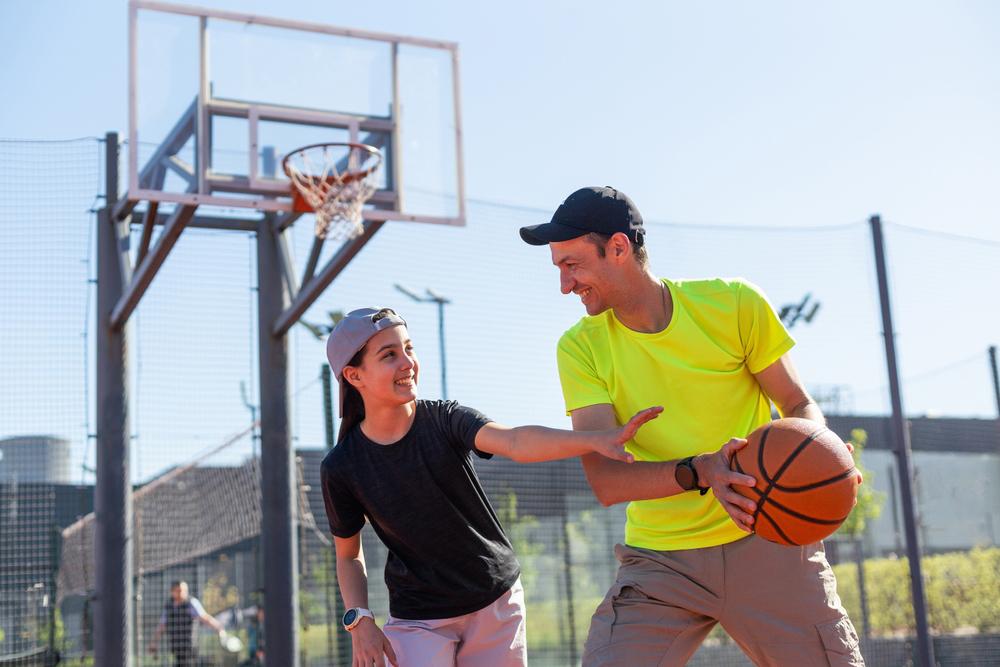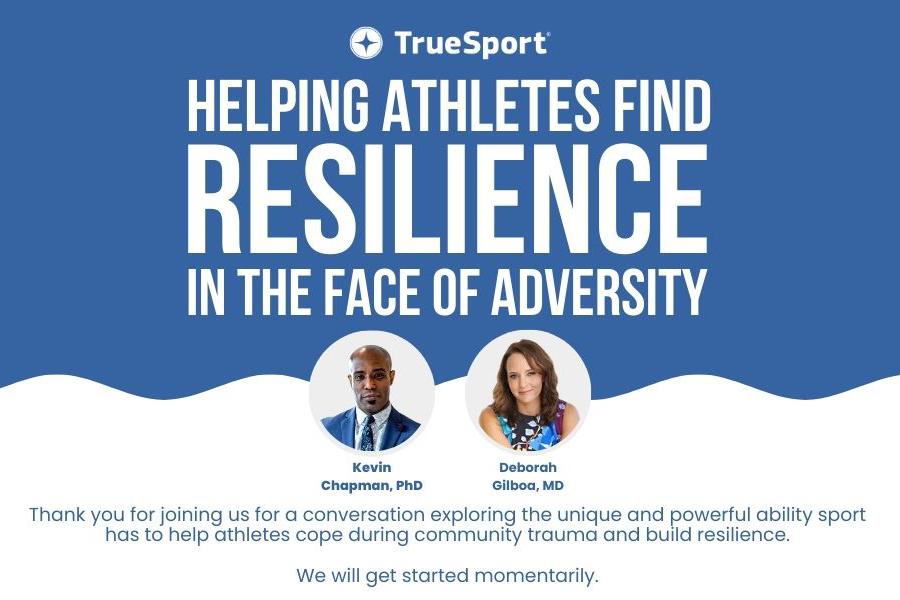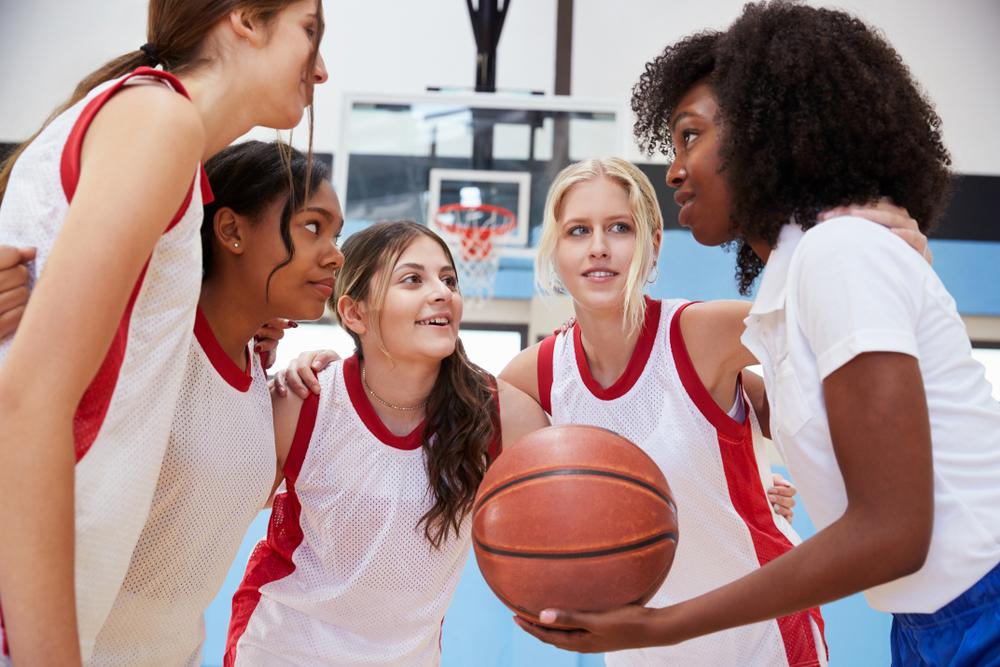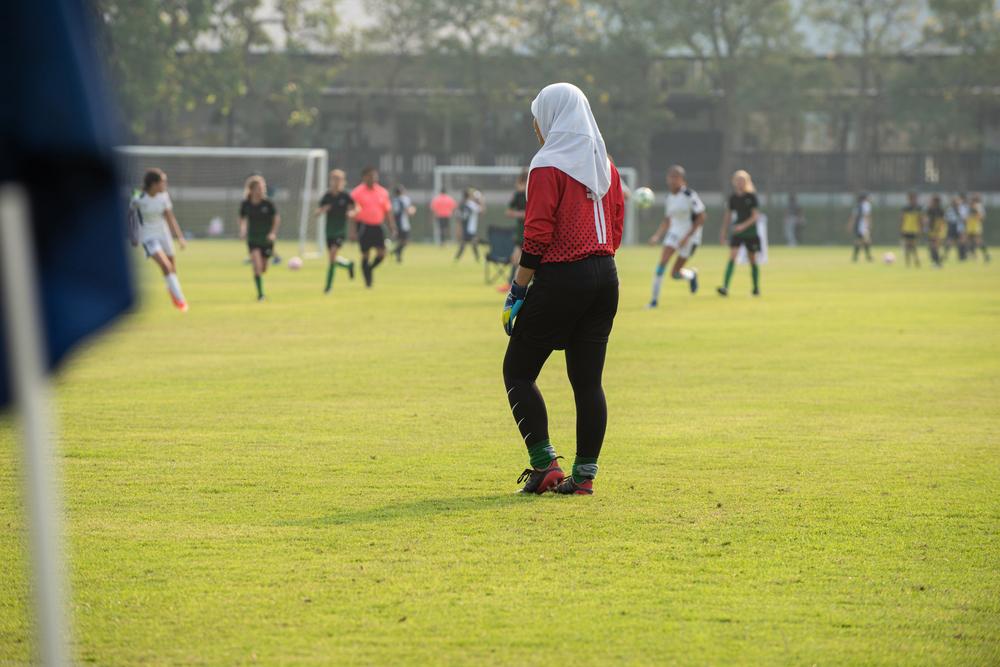Kara Winger: I’m Kara Winger. We are here in Colorado Springs for the TrueSport Expert Series 2022. With, for this episode, Dr. Kevin Chapman and Nadia Kyba. We’re talking about equity versus equality in this episode, how it’s impossible to treat everyone the same. So, a lot of people think equity and equality is the same thing. But Kevin, can you give us some definitions?
Dr. Kevin Chapman: Yeah, sure. I think that’s a great point, Kara. I think that most people do think that equity and equality are the exact same and they’re actually much different concepts and they’re both good and important. But equality, on the one hand, is really saying that we’re giving everybody and groups of people, particularly marginalized groups in particular, an equal access to opportunity. And so that’s equality, is everybody has the same kind of opportunity. Equity, on the other hand, though, refers more so to taking everybody as individuals and saying we have different experiences. So, giving them the exact resources they need to have a similar outcome as someone else. So, they are different concepts but both very important.
Kara Winger: Yeah. Would an example would be like maybe I grew up in a home that taught me how to find resources on the Internet for jobs that are available to everybody. But someone else may not have learned how to do that, like how to just seek out that information.
Dr. Kevin Chapman: Yeah, that’d be a great example. Right, exactly. Because, like, you know, ultimately I’d say like, I used to be a professor, for instance. It’s like saying, well, you got a job as a professor. Awesome. But if I don’t get startup funds, how can I be as successful as someone who’s been there for years? Right?
Kara Winger: Right. Or access to the resources that you could use to teach your kids, etc..
Dr. Kevin Chapman: Absolutely.
Kara Winger: Very good. So, simple. Straightforward. Thank you.
Dr. Kevin Chapman: Indeed.
Kara Winger: What about unconscious bias? Nadia, what is that?
Nadia Kyba: Well, unconscious bias really builds on what you were both just talking about. Unconscious bias is something I’ve heard Glen and Doyle say is, “In the water.” So, it’s something that we’re born with. We’re born as blank slates. But from the time that we start having interactions with other people, our unconscious bias is built. And so, these are biases that we’re not necessarily aware of happening. So, could be that when we’re babies, our parents may give us if we- first of all, we get assigned a gender. So, if we’ve been assigned a female gender, they may give us a doll and then you give us a white doll. And so, the messaging there that informs our unconscious bias is that while I’m a little girl and the norm is that babies are white, white is just the norm in society, and I’m going to grow up to be a caregiver, whereas they may give a little boy a fire truck, and that may be what they grow up with. Or they may have conversations at the dinner table with their daughter about what man are you going to marry. And so, then being heterosexual becomes that norm for that person and all of those things contribute to your unconscious bias as you’re going through the world. And where that becomes a bit of a problem is when it impacts your decision making. So, it’s important to be aware of your unconscious bias and how that plays into decision making.
Kara Winger: So, I grew up in southwest Washington, Vancouver, wonderful Pacific Northwestern, like I love it there. It’s so green. There’s water, there’s mountains, there’s everything. Not the most racially diverse place. So, I just happened to be a javelin thrower, happened to be in a sport that when I went to college on scholarship, I was exposed to people who didn’t look like me. And there were a couple people of color, and that was great in high school. But then I just like, my world gradually expanded through sport in a way that taught me, you know, now at the professional level, I’m typically the minority in my sport. And I’m very grateful for that because it was very different than the unconscious bias that I grew out of through sport. So, what are some ways that unconscious biases may be reinforced in sport? And how can we encourage coaches and parents to combat that?
Nadia Kyba: Well, I really think that it’s hard work, and I just want to say that to everybody that it’s hard work. It’s messy work examining things that you’re not aware that you’re doing. It takes courage. When I think about sports, I think about just simple things, like when are practices held and is the decision making around when they’re held, taking into account faiths that are non-Christian. So, is it happening on a religious holiday that may impact some of the athletes? Are there are spaces where the team’s practicing, where if there is an athlete who is Muslim, is able to go and pray? If they’re at a tournament all day, they’re going to need that space. So, just becoming aware of biases and how we set things up and how we structure things when we’re considering sports and then thinking about who we’re not including and how that bias is impacting those people.
Dr. Kevin Chapman: Yeah, I agree with that, Nadia. And I also would add to that that I think in many ways thinking about the unconscious biases, the way stereotypes develop as well. You know, we are socialized to think about certain people of color, for instance, playing certain sports or not playing certain sports. So, we developed these phrases. There was a movie in the 90’s, “White Men Can’t Jump.” Obviously not true, but nonetheless, it’s something you grow to think and that’s just one of hundreds of examples of the way unconscious bias can bleed into a sports culture and assume like make us assume things that aren’t in fact true just because we had a perspective based upon, you know, one or two people that we encountered, when in reality that we perpetuate those sort of stereotypes in our sport. And that can be very damaging to people for sure.
Kara Winger: Yeah, language is important and the way you talk about people’s differences is also really important. So, culture on a team to give space to those different, you know, different religions and faiths, like you said, can be really important. I grew up with some girls who were from Mormon families, so they were not allowed to play in softball tournaments on Sundays. And we never really talked about that. Like it wasn’t an open discussion. It was just like, oh, she’s not here today. And all the young kids are like, “Why? Like, what did she do wrong?” You know, instead of really embracing all of the differences of everybody growing up.
Dr. Kevin Chapman: That’s a great point. Yeah.
Kara Winger: So, you know, I was born in 1986 and I definitely have grown up with the idea of what colorblindness is and that, you know, you maybe we’re supposed to be colorblind growing up, but that’s not true anymore. Talk to me about that concept and what is more helpful.
Dr. Kevin Chapman: Well, it’s interesting because Nadia mentioned this idea of it being very powerful and it’s also a very uncomfortable, right? So, when we think about concepts like being colorblind. Many people who say they’re colorblind, meaning I don’t see color, everyone’s the same.
Kara Winger: They’re drawing attention to it.
Dr. Kevin Chapman: Precisely. And I think that that’s well intentioned, to be clear. Right. I think is well-intentioned. But the problem with that is when we say we’re colorblind, we discount the experiences of others, like you said earlier, Nadia, it’s like it goes back into this conversation of equity and equality. It essentially says, since I don’t see you, your experiences they must be the same as mine. So therefore, if you point out any discrepancy, you’re the issue and not me.
Kara Winger: Not what can I learn from your different experience? How can we grow together and bring different things to the table?
Dr. Kevin Chapman: Exactly.
Nadia Kyba: Yeah, I hear this over and over again, people saying things like, I don’t care if you’re green, black or blue. And I think that that plays a huge role in discounting people’s experiences. And it’s a way of avoiding that conversation and being uncomfortable.
Dr. Kevin Chapman: Yeah, that’s a great point.
Kara Winger: Yeah. Got to be uncomfortable being uncomfortable sometimes.
Dr. Kevin Chapman: Correct. The stress tolerance is very important, especially in sports.
Kara Winger: Yeah, everyone’s experience’s can add to a situation in a different way. But in sports specifically, how can we, as sports administrators really contribute to greater equity?
Nadia Kyba: I was thinking about this question, and I just I think that it’s a good idea to kind of break it down into the different levels in sports. So, for thinking about the micro level where it’s a coach and athletes. One of my favorite phrases is “willing ears to hear and to learn.” And I think for coaches, the more that they’re curious, the more that they’re aware of their social position, their privilege, then they can be willing to learn from those that they’re working with and ask the question of how do I support equity in this group? What are some of the struggles and challenges that you face and that you’re coming from? And be open to difficult conversations, be open to awkwardness and to challenging your own biases and assumptions, because there’s going to be times where, if you are curious, you’re going to learn something that perhaps you’re saying that or doing that is offensive and is offending some people. And that’s great when that happens, because then we can all grow and learn from that. And one of the things I think about a lot is the myth of likability. So, we all want to be liked and we avoid difficult conversations and conflict because we want to be liked. And we think that if we are challenged that people aren’t going to like us. But in fact, it’s the opposite. And it’s a way to build trust on sports teams by being open and curious. And then you can kind of take that into the more micro level where you think about having team meetings, where some of these concepts are talked about, some of the holidays that some of the athletes are having, or if there are things that are happening in the news that are really challenging for some athletes, not ignoring that, but talking about it. So, if there has been, a tragedy within the African-American community or within the indigenous community, don’t ignore it. Because athletes are struggling, talk about it, create that space and let them know that they’re seen and heard. And then at the macro level, as administrators just think about what are some of the things that you’re intentionally doing to create inclusion and equity for girls? Are you creating spaces that they feel comfortable and safe in? And for athletes who are gender fluid, are you creating the right facilities for them to change in? Are you considering some of these things? As I mentioned earlier, are you creating spaces where people may need to go and pray? Just being cognizant of those types of issues.
Kara Winger: So, when I was elected Flagbearer for closing ceremonies in Tokyo, honor of my life, I was aware of the racial not diversity of the flagbearers in Tokyo. I had seen for opening ceremonies that there were tweets like, these are two white people carrying the flag. And then there I am, a white person carrying the flag. It’s a team vote, so my peers chose me. And the real gravity of that for me is that the women of track and field, these diverse, incredible women elected me. But I want to turn that back on them because I know that that’s a complicated thing, too, in this day and age, like the flagbearer in general, the flag in general, there’s so much conversation around that. So, before we got on the bus at closing ceremonies, I wanted to say, I see you, thank you for trusting me in this position. I know that it’s complicated. I respect you so much and I really appreciate this. So, I’m so proud to be a part of your experience.
Dr. Kevin Chapman: Well can I shout you out, Kara? This is definitely off script, but I’d say that oftentimes we talk about the importance of people of color, even in sports, having allies. And I always like to tell people when I do workshops on this kind of content is that we don’t need allies, we need accomplices. And I think that’s what you were. I think in many ways for you to say that and to say, I see you, I hear you, and actually verbalize that instead of just thinking it, that was powerful. And I think we need more people like you to do that.
Kara Winger: I barely got it out. It was so important to me. So, thank you. But what are some experiences like in a coaching role or as a sports psychologist that maybe you’ve seen conversations facilitated well or been a part of that yourself?
Dr. Kevin Chapman: You know, I think one of the things that we often don’t talk about, the elephant in the room, if you will, is oftentimes the gender socialization and stereotypes that go on in men and women’s sports in many ways. And I think that, you know, being a psychologist for two sports teams, one of which being an all male team, one being a female team, you find they’re completely different culturally Like the things that I speak to, say, the women’s team for a professional team would be much different than the guy’s team, where emotional experiences and emotional regulation navigating difficult coaching situations, for example, like having those open conversations without staff. Powerful. Whereas with a male sports team is completely different. It’s almost like pulling teeth in many ways to get many people to talk about emotions unless they’re emotions you’re socialized to experience. As a guy socialized in the United States like anger. Oh, that’s fine. That’s okay. Don’t talk about sadness and don’t talk about anxiety, right? So, until something hits the fan, if you will, and you start getting red carded and losing paychecks, then all of a sudden it’s probably-
Kara Winger: I better address this.
Dr. Kevin Chapman: Indeed. Right. So, that’s sort of the kind of the complexities I’ve had to deal with in my experience. And that’s why it’s so important, I think, too, for us to have when we talk about tips to infuse emotional conversations in the locker room across sports and sports cultures. Because if you do that at the foundational level, it becomes a normal conversation as opposed to an intervention that’s more preventative at that point. And everybody is on the same page from the coach down.
Nadia Kyba: Yeah, I absolutely agree. I think that that’s the key, you’re anticipating conflict. You’re normalizing it and you’re normalizing those conversations and you’re building trust. And then when something comes up, you’re more able to handle it.
Dr. Kevin Chapman: Yeah, absolutely.
Kara Winger: Normalize vulnerability. So, that you can be vulnerable and get stronger together.
Dr. Kevin Chapman: So true.
Kara Winger: Awesome. So, I also officiate for track and field. I’m a certified USATF Official and I have my polo and my badge, and it’s like really fun to give back to my sport in this way. And something that’s a small action that’s really important to me is even at the youth level, to use last names like I’m going to treat all of you like I will make an effort to pronounce your name correctly. No matter what it is, I’m going to ask you how to pronounce it. I will listen and apply that knowledge to the rest of the competition, because I think that it’s just a professionalism thing, and treating everybody the same in the competition professionally is really important to me. So, that small action feels like leveling the playing field. It’s an equality thing that goes really far in, like how the competition is run. And I think that’s applicable to use for as a coach as well. Like what are some actions that show a kid, show the team that you’re treating everyone the way that you would like to be treated and recognizing their differences, but making sure that everyone is seen? How can you be an accomplice and put action behind your intention to create equity and equality on your team?
Nadia Kyba: I think that that is a brilliant example of how you can do it and just make that part of your practice. That’s one of the things I see a lot is kids who are maybe South Asian or have names that are not Western, give an English name or they’ll give a short form of their name and and just say, oh, just call me this. And I think that by learning somebody’s name, it’s just showing so much respect. It’s showing respect for their culture and it’s creating that inclusion that we’re looking for as well as that equity, because if you’re always in the position where you can’t give your actual name, then that’s not equitable.
Kara Winger: It’s not your full identity.
Nadia Kyba: Right, it’s not your full identity. So, I think that if you can be reflective about those little things that you can do or considering with the pronouns that you’re using when you’re talking to your athletes rather than assuming that it’s he/she asking them and having that conversation right at the beginning of the season, so that, you know that if there are athletes who are gender fluid asking what pronouns they prefer to use. So, being really intentional and thinking about some of these things ahead of time, I think that that’s important.
Dr. Kevin Chapman: And not standing by idly and letting things happen like microaggressions and things like that. And I think in sports, especially with a young athlete, I think it’s essential we talk about being an ally or like we just said, I think it’s important to be an accomplice. And a better way to put being an accomplice for a young athlete would be being a good teammate. And I think being a good teammate is essential by standing up for teammates, not allowing them to be, you know, hypocrites and to say things that would be very offensive to someone if they were to hear it as well. That’s just being a good teammate. Right. And I think that that can kind of instill the justice mentality in young athletes at a very early age and help them throughout their lives as a result.
Kara Winger: Yeah. Disrupt any, you know, joking that might be surface-level joking, but that’s not what it is.
Dr. Kevin Chapman: Exactly.
Kara Winger: And so, just taking the action to say, hey, that’s not okay, we shouldn’t treat this person that way or saying, I’m curious what you meant by that. Tell me more. Expand on that idea or pulling that person aside to have that conversation so that there isn’t further discomfort from the person that’s being targeted. But you’re still disrupting that.
Dr. Kevin Chapman: Yeah, that’s good.
Nadia Kyba: Yeah. I think any time you ignore one of those jokes, you’re condoning it. And although it’s uncomfortable to address it, it’s absolutely necessary to address it right at the beginning because when you’re condoning it, it will happen again and it’ll seep into the team’s culture and it will become toxic. And so, it’s just so important as soon as you hear something like that to address it, regardless of your role in team, if you’re a parent, if you’re a volunteer, if you’re a coach, or if you’re a teammate like you’re talking about.
Kara Winger: And as a teammate, I have regrets. Like I didn’t step in and stop conversations from happening on the basketball team that really affected our performance on the court. And at the time, that was the most important thing. But looking back, that was not the most important thing. It was the social interaction. It was the demeaning of a person. And, you know, that can be really hard as a teenager, as a young athlete to have the courage to do that. But it gets easier with practice, and bravery can just manifest in so many different ways once you take that first step.
Dr. Kevin Chapman: So true. Very good.
Nadia Kyba: Absolutely right.
Kara Winger: Thank you both so much for this important conversation on equity versus equality. – Thank you. And thank you, Kevin. -Thank you. – This has been TrueSport Expert Series 2022 Equality Versus Equality. It’s impossible to treat everyone the same way.



